Voting
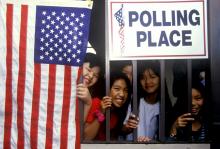
Outside of his role in our family, my grandfather played three roles in life that were dear to him: die-hard Mets fan, deacon in his church, never-miss-an-election voter. He was so unbelievably clear in his intention about voting, and perfectly committed to voting. He made that connection between faith and action.
And in his way, he lived out something I think about all the time: how to make our presence in the world powerful enough to change it.

My neighborhood polling place is in a church a short walk from my house. But providing a space to vote is about as political as many churches get. A study I recently published suggests fewer churches are participating in political activities such as sponsoring candidate forums, conducting voter registration drives, and distributing voter guides.
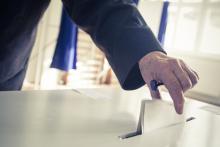
Are voting restrictions about voter fraud, or are they just a ruse to suppress likely Democratic voters?
Since 2010, conservatives have instituted voting restrictions in 21 states, the most well-known of which are laws that require photo IDs at the polls.

What criteria do we use to pick a president?
We hear the daily stats and buzz, but presidential elections are about the big picture — where we want to go and the best way to get there. This means looking not only at political options but also at the way we humans are set up — how we’re wired. When public policies don’t account for that, we have reduced horizons, diminished resources, and polarization.
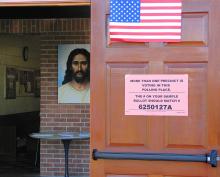
As Christians, our actions and our words represent our faith. I don’t need a bumper sticker to tell you that. Let’s make sure the loudest voices are the ones for equity and transformative love across difference. Because each day as a Christian, you cast your ballot.
I’m a Christian, and each day, I vote.
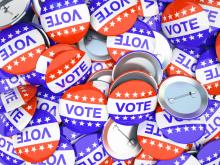
North Carolina's voter ID law, which requires would-be voters to display an acceptable form of government-issued voter ID in order to cast a ballot, went into effect for the first time in last night's primary. Early voting behaviors offered a first look at some of the problems that come with these voting restrictions, reports ThinkProgress. Namely, how young people are being blocked from voting.
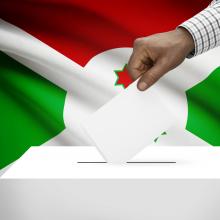
“There is nowhere a human being should be allowed to enslave others.”
This is a statement made by Burundian Catholic Archbishop Simon Ntamwana, referring to the Burundian president who was seeking an extra term in power. The archbishop was implicitly calling the president's actions unjust and unacceptable.
Indeed, the term limit crisis in Africa needs to be considered in the same light as the liberation, decolonization, and democratization movements against slavery and apartheid. Similarly to those struggles in history, today's term limit crisis in Africa is characterized by people struggling against oppression and political injustice.
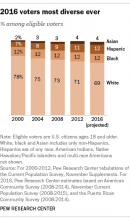
The good, the bad, and the ugly of this campaign season has exposed the depth of some of the United States’ racial and ethnic fault lines. But the fault lines themselves are moving. The 2016 electorate will be the most racially and ethnically diverse ever, due largely to U.S.-born Hispanic youth and naturalizations of Asian immigrants.
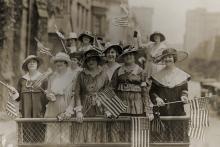
I've done it in booths at a New York City public school, and the 92nd Street Y. I've done it on a small, enclosed counter in DC. But you never forget the first time you voted.
My first time at the polls was not particularly spectacular — it was an off-year for elections, so I voted on a referendum. Since then I have voted every year except twice. Once was on another off-year — I was in grad school for public administration and had to finish a statistics assignment. And for the other, I’d just become a DC resident, too late to vote in the special election that year.
In case it’s not obvious, voting is important to me, and I’m kind of a dork about it. And when I consider the hard fight for women’s suffrage, I feel that the best way to honor the women who fought hard for that right is to responsibly exercise it.
So it’s disheartening to hear women say that they don’t really pay attention to politics or take the time to vote. And as a DC resident whose interests are determined by the legislators of other states, it’s hard to watch anyone take for granted their right to vote.
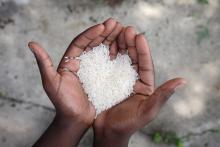
IT’S BEEN HALF a century since Lyndon Johnson declared a War on Poverty, and obviously this is a war that we still haven’t won. According to the Census Bureau, in 2013 there were still 45.3 million Americans living in poverty. That’s nearly 15 percent of the American people, including one in five children and one in three children of color.
Progress has been made on global poverty, with the proportion of people living in extreme poverty worldwide cut in half between 1990 and 2010, but the World Bank estimates that 1 billion people worldwide still live on less than $1.25 per day. Push that up to a mere $2 per day and the number is 2.2 billion people—almost a third of all the people on Earth.
I’ve always described the central fact of God’s economy as this: There is enough, if we share it. There’s no question that we have the resources to end poverty globally and domestically. What we lack are the moral resolve, the political will, and better strategies to make it happen. Yet those three may finally be coming together. I believe there are new confluences occurring that could be both helpful and hopeful.

I'll never forget the time I was handed a Voting Guide when I walked into church on Sunday morning.
It was 2008 and I was a 23-year-old single woman, attending a large Southern Baptist congregation in Florida for the very first time.
The high school football coach I'd just written a profile on for the front page of the sports section had recommended I attend his church. He was, I'd ascertained, a good man and a genuine Christian. Plus, he and all the other football coaches from the area attended church here. There was the potential of additional scoops, plus an opportunity to make friends - or more - with some of the younger assistant coaches.
It was an impressive campus, all palm trees and white arches. We sang some familiar music, and to be honest, I don't even remember the sermon.
I remember the seemingly harmless Voters Guide. It was 2008. On the second page, listed in alphabetical order, was the man who would become our nation's first black president.
BARRACK OBAMA
It could've been a simple typo, an auto-correct. But as we were all told to bow our heads and pray for awhile to end abortion, I figured out this little Voters Guide might have a slight political agenda. And perhaps that little agenda might have contributed to them not bothering to spell the Democratic candidate's name correctly.
Much as I would have loved going to the church of the football coaches, I couldn't go back after that.

Conservative Christians are taking credit for the Republican sweep of the U.S. Senate and GOP victories farther down the ticket in Nov. 4's midterm elections, and they predict they will prevail again in 2016.
“This is not only the largest single constituency in the electorate, but it is larger than the African-American vote, the Hispanic vote, the union vote, and the gay vote combined,” Ralph Reed, one of the most recognized figures in conservative Christian politics, said Nov. 5 in a celebratory post-election press conference.
Reed, who chairs the Faith & Freedom Coalition, which mobilizes conservative Christian voters across the nation, said politicians in both parties ignore this constituency “at their own peril.”
Reed pointed to a poll commissioned by his group that shows that conservative Christians — Protestants and Catholics — made up 32 percent of the Republican electorate, and that they overwhelmingly voted (86 percent) for Republicans Nov. 4. These voters contributed 52 percent of the total votes received by Republicans, according to the Public Opinion Strategies survey, which had a margin of error of plus or minus 3.5 percent.
But some experts pointed out that little has changed in the religious electoral landscape.
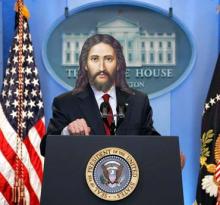
We’d all love to claim Jesus for our team, but in doing so, we can safely assume that Jesus actually would wriggle free from such limitations. While it would be comforting to validate ourselves by claiming Jesus as a Baptist, Disciple, Catholic, or something else, what we’re effectively trying to do is keep from changing ourselves. We want to rest in the certainty that we’re all right how we already are, with no real need to grow or do things differently.
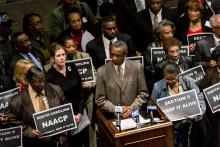
I was on the airplane, looking forward to reading Taylor Branch’s new book, The King Years: Historical Moments in the Civil Rights Movement. As I opened my Kindle, I realized that it offered large excerpts of Branch’s previous works, and was glad that while I have the other books in hard cover, I had these stories in my Kindle. But as I re-read some of the accounts, I realized that my 40-something-old self reacted differently than when I first read some of the accounts when I was 20-something. My younger self yearned to know: How did they organize? How did they deal with differing motives and different movements? And I yearned to believe that I, too, would have sacrificed my being for “The Movement.”
My late 40-something-old self read these words as a mother — as someone who understood the fury of the parents who were scared as their children sacrificed their very lives for justice’s sake.

This starts as a question: What can I do now, as a citizen?
On Nov. 6, the answer was clear. Vote. Vote. Vote.
Well and done. Four years ago, too, I voted in November on Election Day, with a box of Fruity Cheerios under one arm.
In the weeks leading up to the election, my civic heart was tuned well. Watch the debates. Discuss. Then vote, because, actually, the pressure is quite enormous. Vote or Die. The Facebook news feed can crush you, flatten you into voting, which is all well and good. I can be for that. Civic pressure.
But come Nov. 7, the pressure released. The civic duty was fulfilled. And my question remains, sincerely. What can I do now?
I ask the question; one, because I do not know the answer; two, because I have an entirely different answer. So first, the question stands: What can I do now, as a citizen?
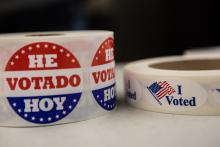
Exit polling from Tuesday’s presidential election is offering new hope to activists advocating for comprehensive immigration reform. The Latino community was instrumental in reelecting President Barack Obama, as record numbers turned out to vote and supported the president by over 70 percent. These numbers send a clear message to opponents of immigration reform that demonizing immigrants and blocking progress makes for a poor political strategy.
Pundits are opining that Congress may be more willing to discuss comprehensive reform, a promise President Obama made but has been slow in fulfilling due to congressional opposition. Indeed, republican leaders in Congress have already been altering their positions.
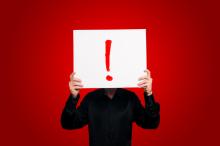
Last month, Lauren Anderson Youngblood, communications manager for the Secular Coalition for America, approached Broderick Johnson, a senior adviser to the Obama campaign, as they both left a conference on religion and the election.
The SCA is an umbrella group representing 11 nontheistic organizations. So who, Youngblood asked Johnson, could she reach out to with their concerns about civil rights, access to health care and education?
“He said, ‘We don’t view you as a constituency,’” Youngblood said. “He said, ‘We don’t do outreach to that community.’”
After Tuesday's election, that may soon change. According to a Pew Forum on Religion & Public Life study released last month, “nones” — those who say they have no religious affiliation or do not believe in God — are the fastest-growing faith group in America, at 20 percent of the population, or 46 million adults.
In addition, nationwide exit polls conducted Tuesday show that "nones" made up 12 percent of all voters — more than the combined number of voters who are Jewish, Muslim or members of other non-Christian faiths (9 percent), and only slightly smaller than the combined number of Hispanic Catholics and Black Protestants (14 percent).
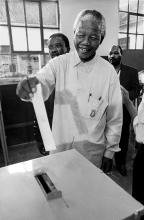
What does it feel like to have your vote stolen?
It sucks. It feels like someone literally let all the air out of my balloon animal.
Late in September, I happily filled out my absentee ballot request form to the DuPage Election Commission. Illinois had a new measure that allows for anyone to request an absentee ballot. I expected for there to be a delay.
So I waited.
And I waited some more.
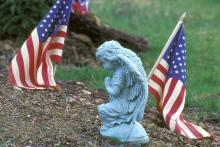
It’s here, God — Election Day in America. Today is the day when Americans everywhere are given the privilege and responsibility to exercise dominion (agency) at the polls.
Scripture tells us every human being is made in the image of God. We are, therefore, equally worthy of protection of the law. The United States Constitution and its Amendments tell us we are equally worthy of life, liberty, and the pursuit of happiness. Yet, at this very moment, laws stand poised to snatch dominion from the hands of the poor, the weak, and the vulnerable, ethnic minorities, students, and the elderly. Some scurrilous elected officials have worked behind the scenes to suppress the ability of voters to elect the person of their choice — all for the sake of politics
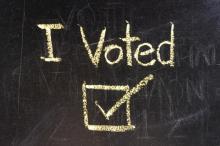
For the next 12 days it’s all about the ground game. With most voter registration deadlines passed, the fight against voter suppression has shifted focus from registration drives to calling banks, car-pools, and calls to vote early.
Bishop Dwayne Royster is Executive Director of P.O.W.E.R. (Philadelphians Organized to Witness Empower and Rebuild), a 37-member interfaith organizing coalition in Philadelphia. Royster is also lead pastor of Living Waters United Church of Christ in Philadelphia. In a recent interview Bishop Royster explained just how vital the fight against voter suppression has been for the people of Philadelphia.
According to a study conducted by the Pew Charitable Trust’s Philadelphia Research Initiative, Philadelphia is the 6th poorest large city in America with a poverty rate that held at 25 percent in 2011. The unemployment rate is higher than the national average at 11.5 percent, and nearly half of all high school students engage in a fist fight at least once in the course of a year. Tensions are high in the City of Brotherly Love.